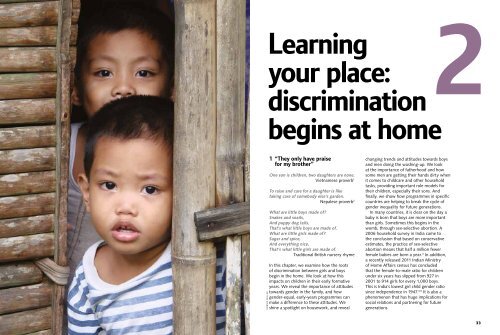Because I am a girl: The State of the World's ... - Plan Deutschland
Because I am a girl: The State of the World's ... - Plan Deutschland
Because I am a girl: The State of the World's ... - Plan Deutschland
You also want an ePaper? Increase the reach of your titles
YUMPU automatically turns print PDFs into web optimized ePapers that Google loves.
Learning<br />
your place:<br />
discrimination<br />
begins at home<br />
2<br />
B o n n i e M i l l e r<br />
1 “<strong>The</strong>y only have praise<br />
for my bro<strong>the</strong>r”<br />
One son is children, two daughters are none.<br />
Vietn<strong>am</strong>ese proverb 1<br />
To raise and care for a daughter is like<br />
taking care <strong>of</strong> somebody else’s garden.<br />
Nepalese proverb 2<br />
What are little boys made <strong>of</strong>?<br />
Snakes and snails,<br />
And puppy dog tails,<br />
That’s what little boys are made <strong>of</strong>.<br />
What are little <strong>girl</strong>s made <strong>of</strong>?<br />
Sugar and spice,<br />
And everything nice,<br />
That’s what little <strong>girl</strong>s are made <strong>of</strong>.<br />
Traditional British nursery rhyme<br />
In this chapter, we ex<strong>am</strong>ine how <strong>the</strong> roots<br />
<strong>of</strong> discrimination between <strong>girl</strong>s and boys<br />
begin in <strong>the</strong> home. We look at how this<br />
impacts on children in <strong>the</strong>ir early formative<br />
years. We reveal <strong>the</strong> importance <strong>of</strong> attitudes<br />
towards gender in <strong>the</strong> f<strong>am</strong>ily, and how<br />
gender-equal, early-years progr<strong>am</strong>mes can<br />
make a difference to <strong>the</strong>se attitudes. We<br />
shine a spotlight on housework, and reveal<br />
changing trends and attitudes towards boys<br />
and men doing <strong>the</strong> washing-up. We look<br />
at <strong>the</strong> importance <strong>of</strong> fa<strong>the</strong>rhood and how<br />
some men are getting <strong>the</strong>ir hands dirty when<br />
it comes to childcare and o<strong>the</strong>r household<br />
tasks, providing important role models for<br />
<strong>the</strong>ir children, especially <strong>the</strong>ir sons. And<br />
finally, we show how progr<strong>am</strong>mes in specific<br />
countries are helping to break <strong>the</strong> cycle <strong>of</strong><br />
gender inequality for future generations.<br />
In many countries, it is clear on <strong>the</strong> day a<br />
baby is born that boys are more important<br />
than <strong>girl</strong>s. Sometimes this begins in <strong>the</strong><br />
womb, through sex-selective abortion. A<br />
2006 household survey in India c<strong>am</strong>e to<br />
<strong>the</strong> conclusion that based on conservative<br />
estimates, <strong>the</strong> practice <strong>of</strong> sex-selective<br />
abortion means that half a million fewer<br />
female babies are born a year. 3 In addition,<br />
a recently released 2011 Indian Ministry<br />
<strong>of</strong> Home Affairs census has concluded<br />
that <strong>the</strong> female-to-male ratio for children<br />
under six years has slipped from 927 in<br />
2001 to 914 <strong>girl</strong>s for every 1,000 boys.<br />
This is India’s lowest <strong>girl</strong> child gender ratio<br />
since independence in 1947. 4,5 It is also a<br />
phenomenon that has huge implications for<br />
social relations and partnering for future<br />
generations.<br />
32 <strong>the</strong> s tate <strong>of</strong> <strong>the</strong> world’s <strong>girl</strong>s 33



